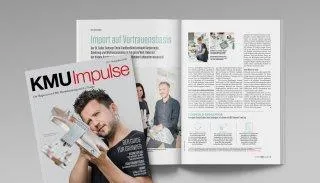
Import based on trust ‑ Insights from Roberta and Tobias at SME Impulse!
Personal contacts are essential even for an online shop. Roberta and Tobias Zingg therefore visit the most important international fairs for children's fashion and toys twice a year. That is where the St. Gallen entrepreneurs meet the high-quality brands for Stadtlandkind. For seven years, the former clerk and e-commerce specialist have been working together with a couple of friends in the online trade. Thanks to the help of colleagues, acquaintances and relatives, the concept store could be set up with a relatively small budget and today generates enough turnover to employ seven permanent employees and various freelancers. The warehouse in Wittenbach in the canton of St. Gallen houses around 19,000 articles from small, exclusive production facilities. They are located in Switzerland, Scandinavia, Southern, Western and Eastern Europe and America. According to Roberta Zingg, it was clear from the get-go that the company wanted to focus on international suppliers. In Switzerland, the range of products that met the founders' high standards of design, organic, sustainability, quality, fairness and diversity was far too small.
Advance payment needs liquidity
Since fashion collections have to be ordered about one year in advance, the main difficulty in the beginning was to convince the foreign suppliers of a shop that was not yet online. "We travelled to the trade fairs with nothing in our hands and tried to win the brand owners for our project in personal talks," says Roberta Zingg. That was hard work. Another hurdle was the financing of the products. The suppliers insisted on advance payment for a completely unknown store like Stadtlandkind. It took months for the merchandise to be produced, put online, purchased and finally paid for on account.
Credit allows faster growth
This presupposed that the entrepreneurs always had their liquidity in mind. As Tobias Zingg explains, it had always been his goal neither to borrow money nor to tap into his own assets. This had worked for a long time. However, when one wanted to grow faster, a loan had become unavoidable. Stadtlandkind became so well known via social media channels that orders were received from Europe and overseas. International business therefore required more complex solutions than a simple company account.
Stadtlandkind does business mainly in the EU. For this reason, the two entrepreneurs are not using currency hedging instruments today. One can live with fluctuations of the euro. Of course, there are large competitors like Zalando who offer certain brands at lower prices. Stadtlandkind also solves this problem with direct talks. "When I noticed that a Zalando shoe brand cost 20 francs less than ours, I drew the producer's attention to the problem. Now the brand is no longer offered below value", Roberta Zingg is pleased to report. She stresses the importance of such good relationships with suppliers. Complaints about quality or functionality can often also be dealt with in a personal exchange.
Targeting new markets
This also applies to the correct completion of customs forms. Since Tobias Zingg accompanied companies entering the Swiss market at the time, he knows the permitted formulations with which import expenses can be reduced. Many partners need a lot of persuasion before they send the documents correctly, but the bottom line is that it pays off. Stadtlandkind is now growing at a double-digit rate. Next, the SME wants to conquer Western Switzerland. New foreign markets are also to be targeted in the medium term. Accurate financial planning will be essential.
Excerpt from the interview with Denise Weisfolg on behalf of UBS Switzerland

 Thank you! You have successfully entered the newsletter!
Thank you! You have successfully entered the newsletter! 

